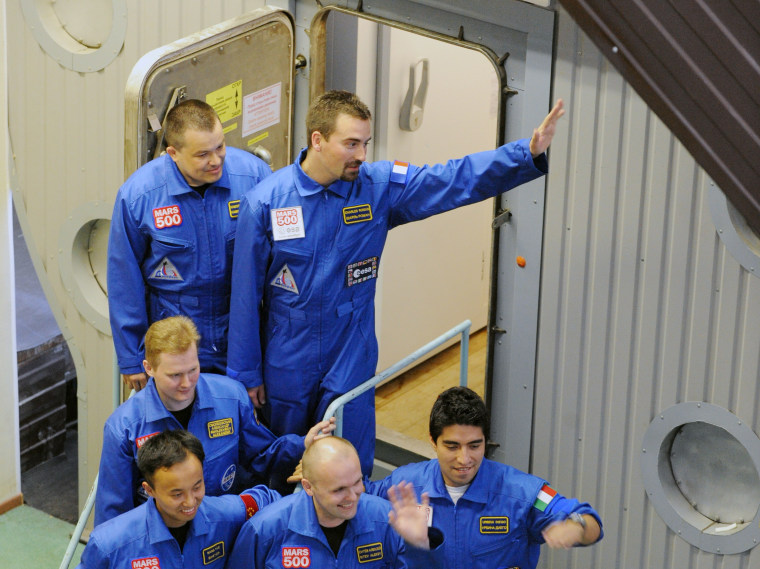An international team of researchers on Thursday launched a grueling simulation of a flight to Mars that will keep them locked in a cascade of windowless modules for 520 days — the amount of time required for a return trip to the Red Planet.
While the experiment will not involve weightlessness, the six-member, all-male crew of three Russians, a Frenchman, an Italian-Colombian and a Chinese will face conditions aimed to simulate stress, claustrophobia and fatigue that real astronauts would face during interplanetary travel.
"For me, it will be mainly my family, and the sun and fresh air," French participant Romain Charles said when asked what he will miss most during the long confinement.
The Mars-500 experiment is conducted by the Moscow-based Institute for Medical and Biological Problems in cooperation with the European Space Agency and China's space training center.
Psychologists said long confinement would put the team under stress as they grow tired of each other. Psychological conditions can be even more challenging that a real flight because the crew won't experience any of the euphoria or dangers of actual space travel.
Well aware of this hazard, crew members equipped themselves accordingly. For instance, French participant Romain Charles said he was bringing along a guitar to warm the atmosphere. Others said they would bring along books, movies and pictures of their relatives.
The crew spoke about their mission with pride and said they were confident of success. Diego Urbina, the Italian-Colombian member, told a news conference it would mean "accomplishing dreams about the future, doing something that no human has done before."
As part of efforts to keep the crew in good spirits, they will play a match with former world chess champion Anatoly Karpov at some point during their mission.
The facility for the experiment is located in Russia's premier space medicine center in western Moscow. It is comprised of several interconnected modules with a total volume of 550 cubic meters (about 20,000 cubic feet) and a separate built-in imitator of the Red Planet's surface for a mock landing.
The researchers will communicate with the outside world via Internet — delayed and occasionally disrupted to imitate the effects of space travel. They will eat canned food similar to that currently offered on the International Space Station and take a shower once every 10 days or so — mimicking space conditions. The crew will have two days off in a week, except when emergencies are simulated.
The mission director, cosmonaut Boris Morukov, said the experiment could be disrupted for medical or technical reasons or a personal demand from one of the participants.
"Each crew member has the right to end the experiment and walk out," he said at a news conference. "We have had such negative experience in the past, and I hope it won't happen during this experiment."
A similar experiment in 1999-2000 at the same Moscow institute went awry when a Canadian woman complained of being forcibly kissed by a Russian team captain. She also said that two Russian crew members had a fist fight that left blood splattered on the walls. Russian officials downplayed the incidents, attributing it to cultural gaps and stress.
Morukov said the organizers had considered some female candidates for the current experiment, but they hadn't been selected for various reasons. "Selecting an all-man crew wasn't our goal," he said.
The ESA said the crew will also regularly play video games as part of the agency's project to develop personalized software to interact with crews on future space missions.
Other crew members include Sukhrob Kamolov, 32, Alexander Smoleyevsky, 33 and Alexey Sitev, 38 — all Russians — and Wang Yue, 26, from China.
The organizers said each crew member will be paid about $97,000 for taking part in the experiment.
For mission captain Sitev, the experiment means separation from his wife just a few weeks after the two wed. When asked about marital repercussions, he tried to put on a brave face.
"I'll tell you that it's difficult for me to part with my family, just as it is for any other person," he told journalists just before the experiment began.
